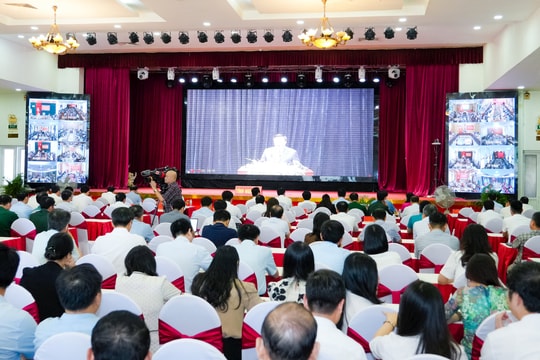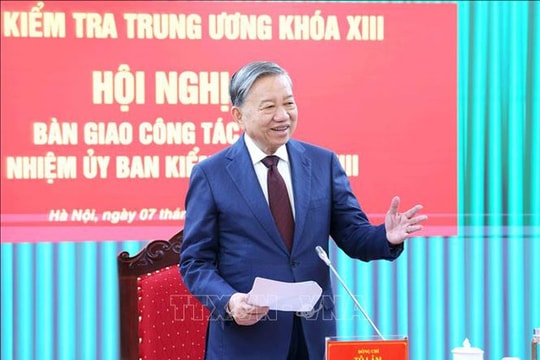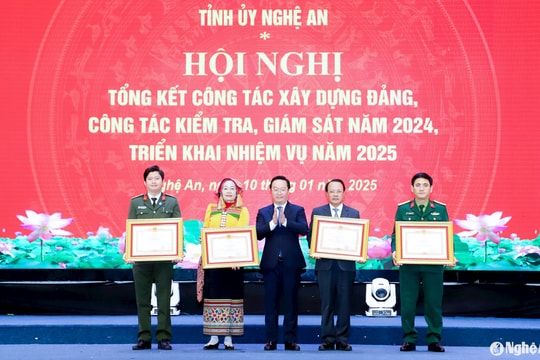National conference on training in inspection and supervision work in 2025
On the morning of July 14, the Central Inspection Committee coordinated with the Ho Chi Minh National Academy of Politics to organize a national conference to train professional skills in inspection and supervision work in 2025. Comrade Nguyen Duy Ngoc - Politburo member, Secretary of the Party Central Committee, Chairman of the Central Inspection Committee chaired the conference.
At the Nghe An province bridge, comrade Vo Thi Minh Sinh - Deputy Secretary of the Provincial Party Committee, Chairwoman of the Provincial Vietnam Fatherland Front Committee, Head of the Provincial National Assembly Delegation chaired the conference. Attending the conference were comrade Pham Trong Hoang - Member of the Standing Committee, Chairman of the Provincial Party Committee's Inspection Committee; along with leaders of the Provincial Party Committee's Inspection Committee, members of the Inspection Committees at all levels.
.jpg)
Speaking at the opening of the conference, Politburo member, Party Central Committee Secretary, and Chairman of the Central Inspection Commission Nguyen Duy Ngoc emphasized that in the process of performing tasks and powers as prescribed by the Party Charter, the Central Inspection Commission attaches special importance to personnel work, considering it a key task that determines the success or failure in implementing the Party's inspection, supervision, and discipline work.
Training and fostering cadres is one of the key tasks and solutions to build a team of truly competent, qualified and capable inspectors who are up to the task in the new situation. Therefore, training and fostering cadres to ensure that the Party's Inspection sector's cadres have a firm grasp of the new regulations is extremely necessary.
.jpg)
The Chairman of the Central Inspection Commission affirmed that the topics introduced at the conference are general and consistent so that those working in inspection and supervision at all levels can grasp, practice and apply them in their localities; at the same time, research is needed to advise and propose adjustments to regulations to suit the actual situation during implementation.
After this conference, we will continue to organize intensive training for each target group to proactively approach and deploy as quickly as possible, meeting the requirements in the new situation.
At the conference, delegates were introduced to the basic contents of Regulation No. 296-QD/TW dated May 30, 2025 of the Central Executive Committee on Party inspection, supervision and discipline work and Instruction No. 08-HD/TU dated June 10, 2025 of the Secretariat.
.jpg)
Regulation No. 296 has omitted articles and contents related to the Party executive committee, Party delegation, Party committees, inspection committees at district and county levels and 2 Party committees of blocs at the Central and provincial levels; and added contents related to the Party committees and inspection committees at all levels of the 4 new Party committees of the Central and 2 new Party committees directly under the provincial level.
New regulations for Party committees and inspection committees at levels directly above the grassroots level (Party committees and inspection committees at communes, wards, and special zones) to suit the practical arrangement of the political system's organizational apparatus and the two-level local government plan.
Supervision work, including regular supervision, is highly valued and is identified as the focus of Party committees and inspection committees at all levels during this period. The Secretariat has stipulated direct supervision through attending meetings of Party committees and Party committee standing committees; through self-criticism and criticism activities of Party organizations and Party members; working directly, attending other meetings and conferences of the supervised subjects.
.jpg)
Indirect monitoring through monitoring software, digital database systems; reviewing reports on the organization and activities of lower-level party organizations; studying documents, reports, and notices of conclusions on inspections, supervisions, audits, etc.
Notably, Regulation No. 296 has added content on income asset control to comply with current regulations of the Party and State on this content.
Specifically, the subjects of control include: Party members who are cadres under the management of the Standing Committee of the Party Committee at the same level (not the Secretary or Deputy Secretary of the same level) and Party members who are obliged to declare and publicize their assets and income from working in Party agencies at the same level and lower levels according to regulations.
.jpg)
The regulation adds the subject of controlling assets and income as "The Inspection Committee of the Party Committee at the level directly above the grassroots level or higher has the authority to control assets and income, decide to verify assets and income of Party members who are cadres under the management of the Standing Committee of the Party Committee at the same level and Party members who are obliged to declare assets and income when working in Party agencies at the same level and lower levels according to regulations, but are not cadres under the management of the Party Committee at the higher level".
Regarding the organizational principles of inspection committees at all levels, there are three new points. For the first time, the regulations on inspection and supervision work mention the issue of the head of the provincial and commune-level inspection committee not being a local person.
The Secretariat stipulates: The Inspection Committee coordinates with the organizing committee of the Party Committee at the same level to advise on the implementation of the policy of arranging the head of the Inspection Committee of the Party Committee (provincial, commune, ward, and special zone levels) who is not a local person according to the Party's regulations on cadre rotation.
.jpg)
The leaders of the Central Inspection Commission also introduced new regulations on principles of disciplinary enforcement within the Party; authority to discipline violating Party members; authority to discipline violating Party organizations; procedures for considering and deciding on disciplinary enforcement; validity of disciplinary decisions; discipline against Party members who violate the law; procedures, methods, and methods of voting on disciplinary enforcement and principles for handling denunciations...
Delegates were informed and introduced about the implementation of the supervision tasks of inspection committees at all levels in conjunction with the implementation of the General Secretary's direction on inspection and supervision work and some typical and common violations discovered through inspection and supervision work; digital transformation of the Party inspection sector...

.jpg)



